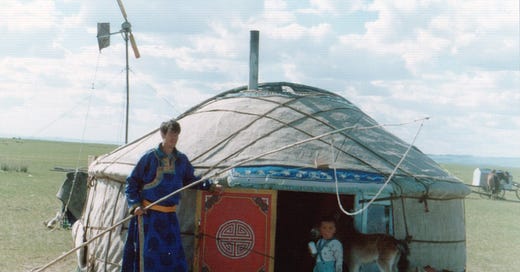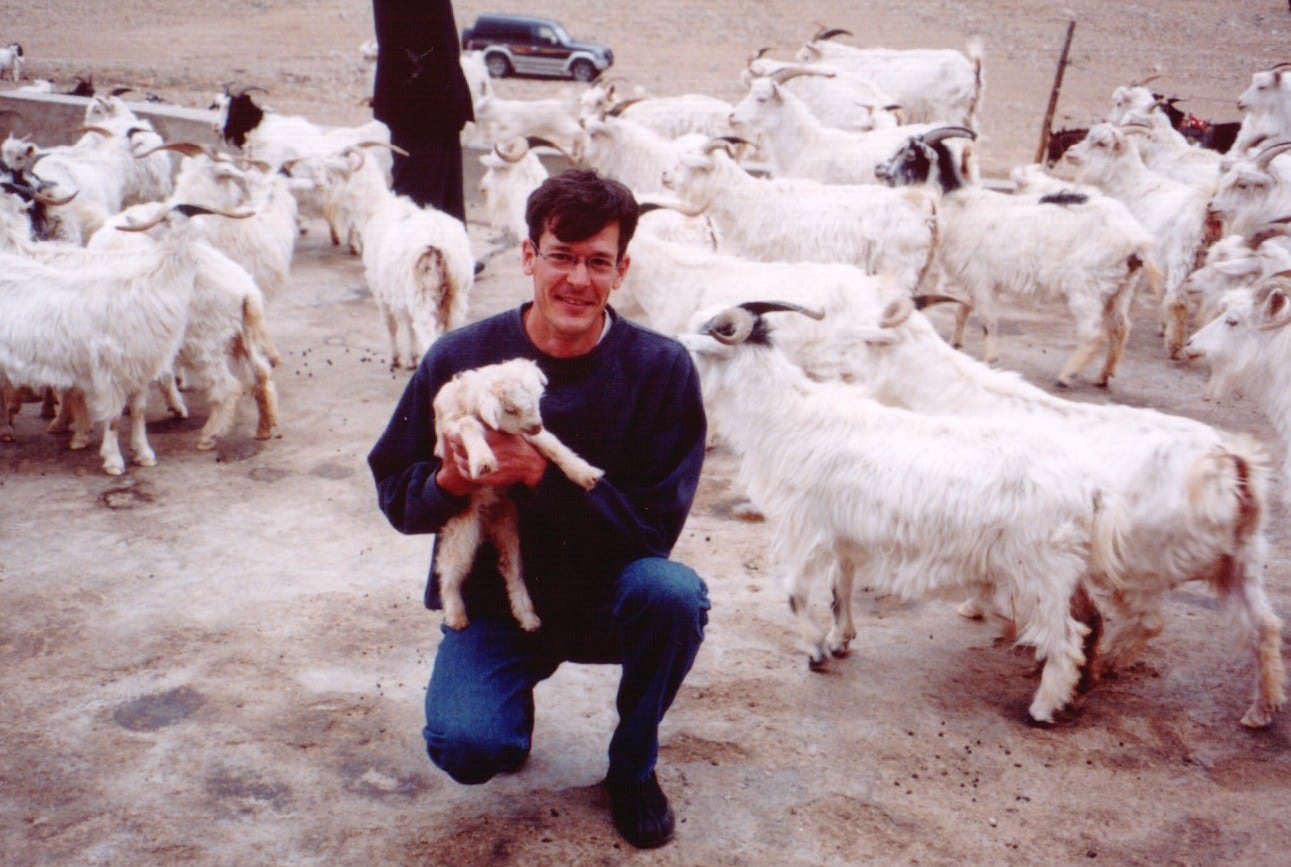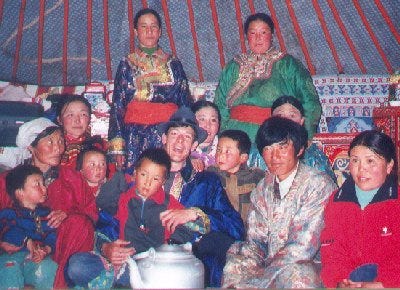Translated from the original Chinese by the author
One summer vacation, while attending university in Inner Mongolia, China—I experienced life with a herder family in a traditional Mongolian yurt, in the grasslands of Inner Mongolia.
During the day, I helped herd sheep and cows, took long walks in the grassland, and enjoyed nature—the landscape of the Mongolian Steppe.
At night, I ate traditional boiled lamb on the bone—using my fingers and knife to dislodge the meat—and snacked on Mongolian style milk cakes. At every meal, I drank traditional Mongolian milk tea.
In the evenings, after dinner, dark night colors covered the sky. I especially enjoyed walks in the grassland during this time of the day. The family stayed inside the yurt preparing to sleep, and I went out to experience the vastness of the universe—to watch daylight preparing for sleep.
Sitting on the grass-covered land, I looked up toward the sky. From east to west, I watched the gradual change from day to night. The sky above me was dark. Westward, still a glimmer of sunlight. In the twinkle of an eye, the entire sky darkened.
I heard the calls of animals around—sounds of barking, baying, and crowing—each near me. Each call, a reminder to their world—it’s time to rest.
Realization that the family was waiting for me to retire hit me as I looked back to the yurt. I headed back. The hazy white outline of the yurt’s felt covering, and a south-facing red wooden square door came into view. I stand one meter eighty-four. When entering a yurt, I always bend down to not hit my head on the doorframe.
Inside, I saw the family of four—mother, father, and two young girls—sitting on the right side of the yurt, chatting. My bedding was on the ground to the left.
Summer nights in the grassland are hot, but inside the yurt it’s cool. This is because they roll the outside felt covering up—leaving a small 15-centimeter gap at ground level for fresh air to enter.
The light went out after we settled.
Half-way through the night, I awoke. I’d drank too much milk tea before retiring. So, I got up from my bedding and crept toward the door. Pushing the red door of the yurt open with my hand, I lowered my head and walked out onto the vastness of the grassland. The pitch darkness embraced me, just as it embraced the light of day.
I stood in awe.
Gazing at the vastness of the starry darkness before me—many stars brighter than others—as if they were closer to me and others further. The close stars, so close that I could reach out my hand, pluck them from the sky, and put them into my pocket.
I stood another moment staring into the night sky—taking in the glistening stars, breathing the night air of the grassland. And I wondered—who else is there gazing at the same night sky, the same sparkling stars?
Original Chinese version 原版:
蒙古包之夜
康鸿熹著/By Todd Cornell
去内蒙古锡盟体验牧民生活的时侯,我有了住进蒙古包的机会。那就是我当年过暑假的方式。白天在大草原上溜达、放羊、放牛、欣赏大自然的风光。
晚间跟家人吃手扒肉、奶酥、喝奶茶。吃完晚饭,夕阳的天色已经开始笼罩了天空。我特喜欢这个时候在草原上溜达。家人在蒙古包里准备休息,而我要去看看庞大的宇宙,看它如何进入睡眠。
坐在草原上抬头往天上看。从上到下能分辨出夕阳漫长的变化。上面的天空已经黑了,下面呢,还有一层光泽挂在那。瞬间整个天空就变成一片夜色。
在我周围,听到各种各样的动物叫声。汪汪叫、咩咩叫、喳喳叫,都在离我很近的地方,告诉我万物也准备入眠。
我往蒙古包的方向一瞧,意识到家人可能等我回去才睡。我开始往回走时,还能看到蒙古包白色毡布的外层,也能看到蒙古包朝南方向的红色方形木门。我人一米八四,进入蒙古包木门时,为了避免碰头要特意低下头。
进去一看,这一家人正在蒙古包右侧坐在地上聊天,是父母和两个小妹妹。我在左侧打地铺。虽然天热,但蒙古包里很凉快。这是因为外面的毡布可以从下往上卷起,可以卷出透风的空隙。
我们马上熄了灯睡觉。
睡到半夜我突然醒了。晚上喝的奶茶太多了。我从地铺爬了起来就悄悄地朝蒙古包木门走去。用手把门推开、低头走出蒙古包、眼睛往天空一看,漆黑的夜幕就摆在我面前。而星星在这当中活泼闪亮着。我愣住了,仔细看着浩瀚的星空。有的亮,有的不亮,好比有的远,有的近似的。那些离我很近的星星,感觉近到可以一伸手就能抓住几颗,塞到裤兜里似的。
继续站了一会,呼吸着草原新鲜的空气,观察着漆黑天空中闪亮的星星,我思索着——这时,还有谁在看着同样的天空,同样的星星呢?
Todd Cornell is the author of Heart Of China, How Mindfulness Changed My Life.
Check out my personal collection of Cultural Revolution artifacts and more.
Visit the Cultural Revolution Artzeum.









